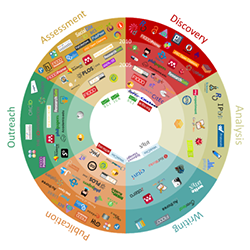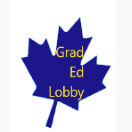Doctoral education in 2015 appears as a diamond encrusted skull with brilliant new developments and a brainless interior. Deans and program heads take little interest in it, preferring multi-media marketing material, ignorance and poorly designed initiatives. Meanwhile software devours academia and transforms communication beyond all semblance to exchanges that began 350 years ago with the first academic journal.
A is for affordances. Innovations in the technologies of scholarly communication afford changes that redefine every aspect of research. At an Innovations in Scholarly Communication conference, in June, in Geneva, the impact of these innovations on scholarly work framed the keynote address to enlarge the vision of learning to reach beyond open access.
B is for blog. A blog written by a doctoral learner, gets the student in a research practice and workflow associated to 21st century patterns in scholarly communication. Blogs allow open access and are legitimate forms of academic writing and communication.
C is for copyright. Doctoral students need to understand copyright, be armed to make publication decisions and follow practices associated to open access.
D is for data; open data that is. Some research methods instructors, use open data to teach research methodologies with hands-on practice. Early career researchers can now obtain open data and see if the results can be replicated or try something else with it. Open data could speed up a doctoral journey. Doctoral programs need to make sure students understand open data and adopt a practice of making data open.
E is for Early Career Researcher (#ecrchat). ECR is a transitional identity, like a caterpillar bound in the chrysalis, about to break free. Pat Thomson who co-wrote the best book about learning in doctoral programs; Helping Doctoral Students to Write: Pedagogies for Supervision, coined the term, early career researcher. A former Aussie, the indefatigable and prodigious Pat Thomson, heads an education department at the University of Nottingham, UK. Pat is among a handful in the world who really understands and provides for the needs of doctoral students. She incorporates social media into her work with her excellent blog, Patter and on Twitter, @thomsonpat.
F is for fabricate. Take the literature, the data, and the methods and fabricate some new insight, instrument, understanding, vehicle, or contribution in a cross, trans or multidisciplinary context. Collaborate with others in interactive media.
G is for Genres of Scholarly Knowledge Production (#goskp). No longer does print dominate, a scholar can draw, film, draw on film, illustrate and #remixthediss, or any combination thereof. Some scholars share and collaborate via iPython notebooks. iPython is an interactive computational environment, in which you can combine code execution, rich text, mathematics, plots and rich media.
H is for hit the Ivory Tower wall, with the intensity of it all, fall apart, and be made over anew through the crucible of doctoral study, which breaks many down. Warning, going through doctoral training is associated with mental health problems. If doctoral programs taught and allowed collaborative research practices, would less students succumb to mental illness? The overwhelming majority of researchers work together, save in doctoral programs.
I is for #ICDDET, the International Conference of Developments in Doctoral Education and Training. Mark your calendars for April 2017, somewhere in the UK, for the third ICDDET. Only 150 doctoral educators attended the second conference in Oxford, England in March 2015. The conference papers will be published at the beginning of 2016.
J is for journals and new alternatives for same. New formats, like PLOS and innovations in scholarly communication means that no grad education is complete unless students graduate knowing multiple ways of representing and sharing knowledge. Academic workflows in some circles aim for new digital forms of publication that trend away from the journal article.
K is for knowledge translation. Try the Dance Your PhD Contest, the 3MT Contest (three minute thesis contest) or PubhD (explain your PhD in 10 minutes in the pub).
L is for links. The 21st century scholar embeds digital links to references and citations, makes data available and computer code too.
M is for MOOC, a massive, open, online course. Dr. Inger Mewburn, The Research Whisperer, offered How to Survive Your PhD to support doctoral students from all over the world between Sept.- Nov. in 2015. This MOOC was free, well thought out, and experimental. Will doctoral programs set out MOOCs to teach courses like research methods using open data or innovations in scholarly communication?
N is for nada, negative, nein, not. Nein to the initiatives to renew and innovate doctoral education without consulting doctoral students. While the successful demonstration that showed how to reform doctoral programs by Carnegie Initiative on the Doctorate, placed interactions between faculty and students at the very heart of a doctoral program renewal, recent initiatives eschew the student. The White Paper on the Future of the PhD in the Humanities, which influenced the report of the MLA task force on the PhD and The Public Scholars Initiative at University of British Columbia sound hollow. Still the same old careless, unexamined doctoral education, with different formats for student work. No advice to gather statistics, learn from doctoral students, understand the effects of the changes, formulate new designs for renewal and contribute to scholarship about research training in any of these initiatives. The Rethinking The PhD: Repenser le Doctorat conference in November 2015 in Calgary, Canada disappointed being so far off the comparison it drew to Rethinking Doctoral Education: The Formation of Scholars.
O is for open. Some researchers smash the old paywall publication practices to open their research practice. Publish only in open access venues. Refuse to peer review for a closed journal. Publish in blogs and with pre-prints. We’re getting past the ‘paper of record’ model into a publication landscape that is rapidly advancing with the affordances of new media.
P is for Ph.D. by publication pathway. The throw ’em into the deep end pedagogy of doctoral programs drowns too many. The 50% of doctoral students who depart doctoral studies before commencement often blame themselves and take on a life long burden of regret and recrimination. the ignorance and indifference doctoral programs show toward students aligns to the blind eye universities turn toward sexual assault on campus. Meanwhile, programs accept no responsibility for their casualties, continuing to admit students and doing nothing different to alter the departure rate. A program with a Ph. D. by publication pathway would at least admit that some demonstrate they can swim in deep end without a doctoral program to show them how, which aligns to doctoral ‘throw ’em in the deep end’ pedagogy any way.
Q is for quester. The elusive and seductive plum that keeps many a graduate student in school for a decade, speaks to some larger urge, verging with desire. So many seek knowledge but so few know how to train a knowledge seeker, beyond throw ’em in the deep end. Graduate school rarely tells the quester how to find a problem, form a question, do a literature review, write an abstract, make a conference poster etc. The quester figures it all out, or not, but in any case will take the blame for failure. No data tells the quester upon application the drop-out rate, the time to completion, the career trajectories. Doctoral programs aren’t interested in such details.
R is for rhizome. 2015 was the 350th anniversary of the publication of the first scholarly journal, Philosophical Transactions of The Royal Society. Knowledge galloped a pace to the point that as of 2010, 50 million articles were estimated to have been published since March of 1665. So many new papers, new fields of scholarship, and new technologies of scholarship oozed out of the first scholarly practices and fields as to suggest a pattern of rhizome-like growth.
S is for software. Software is eating the world of academia. The entire academic enterprise depends on software. New software tools accelerate the pace and variety in knowledge production and its easy fall into obsolescence. Here is an info-graphic that divides scholarly work flow into six phases (discovery, analysis, writing, publication, outreach, assessment) and then further associates tools that facilitate each phase.

T is for Twitter. The sophisticated and vulgar, Shit Academics Say, is a Twitter handle with more followers than Harvard. Here is a December 2015 tweet..The definition of irony: not knowing the difference between a definition and an example. Write your PhD in 100 tweets should be a new knowledge translation contest. Great twitter hashtags #acwri #altac #phdchat
U is for unspent, unheard, and unheeded. If doctoral program administrators ever get around to examining doctoral programs to make them better, the first and best source of information is, as of now, largely unspent. Forming a partnership with graduate students as in GRIP, (Graduate Review and Improvement Program) at the University of Minnesota or as in the CID harnesses this unspent force.
V is for void. The void of knowledge in doctoral education is reflected in vacancies in the journals of the scholarship of teaching and learning about doctoral education. New experiments in research training that drive new models, foster collaboration, embrace co-creation, incite innovation and accelerate development would fill this void.
W is for wake-up call. Wake-up calls came from the three expert speakers from different countries at the International Developments in Doctoral Education Conference at Oxford in March. Their messages; wake-up doctoral educators and pay attention to the design of your doctoral programs. Apparently changes to doctoral education in the humanities before ICDDET from McGill University and the Modern Language Association failed to stop the call. Nor did the knowledge translation contests or professional skills development initiatives change the cry to wake-up. At the next conference, scheduled for 2017, will another wake-up call go out?
X is for information languishing away on old software, floppy disks, losing retrievability, getting x’ed out.
Y is for young and young enough still; older students are signing up for graduate degrees.
Z is for zenith. The affordances of technology which redefine and remake academia now usher in a new peak outside of disciplines, Ivory Towers, and individual effort alone.
Will doctoral programs ever get around to consulting and collaborating with doctoral students as a common practice? Will doctoral programs mirror the practices coming out of innovations in scholarly communication? Stay reading.. The issues herein addressed in Fabrication Nation will continue to unfold and develop in 2016. The times, they are a changin’




